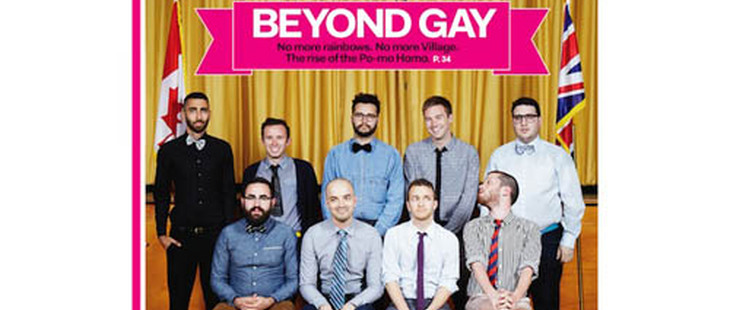
We had a little media phenomenon happen last week, with the publication of a cover story in The Grid about a putative new gay moment, awkwardly called post-mo by its author.
It’s interesting, and it’s good.
Not the story — that was neither, and bad on a level even a barely competent copy editor with her mind on other things could have fixed (“You say here that you were too shy to even think in terms of having sex, but a few lines later that you learned to be confident in your sexuality. Are you confidently ambiguous? That’d be fine except you say you’re gay really a lot. And over here, you deride the oldies for being relegated to darkness and hidden comfort to have their sexual encounters, and laud your own ability to do things online from your bedroom?”).
No, it’s the phenomenon itself that’s good. We don’t tend to react much to our media in these parts, and our media reacts to itself even less. The Globe is too falutin to deign to talk about the Post, and the Star keeps its own counsel. One gets the sense that people are worried about pointing out the mote in their competitor’s eye for fear of having the beam in their own paraded about for all to see.
We’re all very quiet, not that engaged or excited. It’s not the same elsewhere, where writers engage in print battles that get downright nasty, and papers regularly report on each other’s misdeeds and shortcomings.
There are people who find this sort of thing a little inside the beltway, but the media is damn important, not only for the freedoms it represents (and sometimes exercises), but for the ideas is propagates. Most of us think many of the things we think because of some form of media or another or, more likely, an amalgam of facts and options expressed across a broad swath of media.
So it’s good to hold it up to some scrutiny, and not just from time to time, but all the time. This not only points out the errors and shortcuts, the biases and laziness of reporters and editors, but it provides some crucial criticism for the journalists themselves. If you know no one’s really paying attention, and even if they are, they’re not going to bother saying anything, you get the feeling, consciously or un, that you can get away with stuff.
And comment strings are not the answer. The way they’re mostly handled — in the Globe especially, but also the CBC, they’re just nonsense: People hiding behind pseudonyms flinging their poo, and most of it aimed at each other, with the article or spot merely providing the occasion. No journalist I know pays them much mind, I’m afraid. There may be some good stuff in there, but there’s usually too much to sift through to make it worthwhile.
Letters to the editor can still serve this function, as can more deliberate comment systems, like the Disqus one we use here. But one of the best ways of keeping journalists in line is by peer review. It’s a small community, and we all tend to either know or know of each other. Sometimes, we even respect each other. And if we had the idea that they, in addition to the rest of the viewers and readers, were keeping an eye on us, we might up our games somewhat, maybe even show off, which is often entertaining for all concerned.
And as we saw with the fallout from this Grid thing, it can be fun, too.
I was out of town when the issue hit the stands, and I started hearing about the story on Facebook and Twitter. But then it started getting more serious, and articles like this and this and this and this started popping up, and then, even more unusually, this response from the Grid itself.
This is great stuff — not only are other media outlets paying close attention, but the originating publication is getting into some nitty gritty itself, casting a sober second look at its own reasoning, and with any luck, laying some of it bare.
I, for one, loved reading Elie Zaito’s dissection of the process behind selecting what parts of what interviews would be included. It’s something that happens in every story, but something that’s rarely anatomized outside of journalistic circles (and infrequently enough even there).
I’d like to think that if the author, Paul Aguirre-Livingston (who expressed some rather different opinions on Pride not so long ago here), had a clearer idea of the sort of scrutiny he’d be under, he wouldn’t have been quite so stupidly sloppy in print. Because the thing is, what he has to say is not entirely without merit. And if it weren’t for his casual use of the gay ‘we’, his elision of his own circle with an entire generation, or his reading far too much into current fashion trends, there might have been something interesting to the story. There is a non-twink aesthetic out there among young guys. That’s worthy of comment, after decades of the popular definition of young-and-hot being restricted to jocks and femmes. And the repercussions of living after a still quite recent age of intense activism, in a country that, more than almost any other in the world, has taken the fruits of this activism to heart, that’s also something I wouldn’t mind hearing some cogent twentysomething perspective on. And if he ever gets his thinking unmuddled, it looks like he’ll probably be able to come up with the occasional trenchant line (“… for my generation, the big question has shifted from the right to be gay to the right way to be gay,” was pretty good, for instance).
I’m sure the hits on the articles page have been very good, and the pick-up may even be higher than usual for the print edition. I’m equally sure that folks over at The Grid, especially the publishing types, now think there should be more like this. I hope at least someone over there realizes that though controversy is good, its effects are, even in this ADHD world, seriously mitigated by carelessness, sloppiness and thoughtlessness.
People really got into arguing about this story, and though it might have been a little more exciting if I heard anyone other than The Grid arguing on Aguirre-Livingston’s side (even Aguirre-Livingston himself would have been good), I hope they remember the feeling, and keep the habit. We are seriously lacking in thoughtful, non-dogmatic criticism in this country, and I’d love to see more people writing in more forums about more media, and not just when it’s so patently dumb that you can’t help yourself.
Bert Archer is the Toronto Standard‘s Media Critic. He also wrote The End of Gay (and the death of heterosexuality), which, tweets notwithstanding, really has nothing to do with this. If you don’t believe me, check it out for yourself.















